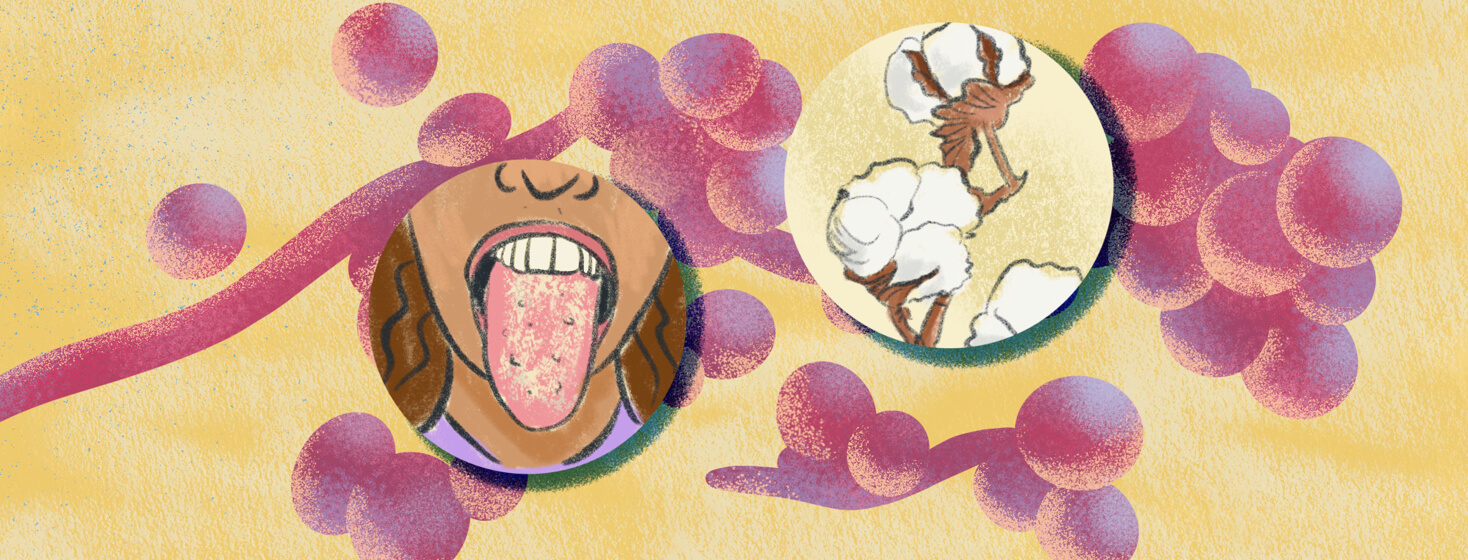CF and Yeast Infections
Candida is a yeast, a type of fungus, that inhabits the normal flora in humans. However, overgrowth of candida can result in yeast infections; another term for these infections is candidiasis. Candidiasis can occur in the mouth, genitals, or in extreme cases, disseminate throughout the entire body.
There is a link between cystic fibrosis (CF) and candidiasis. Studies have found that people with CF are more prone to yeast infections. There are various reasons why this may be the case. The two most common types of yeast infections that people with cystic fibrosis experience are thrush and vaginal candidiasis.1
Thrush and cystic fibrosis
Thrush is also known as oropharyngeal candidiasis. It is essentially a yeast infection in the mouth. People with CF have a higher risk of thrush due to frequent use of antibiotics, concomitant diabetes, and inhaled steroid use. Candida is the second most frequent type of fungus to colonize the airways of people with CF.1
Symptoms
Many people with oral thrush have no symptoms. Those who do experience symptoms may describe the following:1
- A cotton-like feeling in the mouth
- Pain during eating and swallowing
- Taste abnormalities
- Soreness or redness at lesion sites
- Cracks on the inner corners of the mouth
Diagnosis
A diagnosis of oral thrush is suspected when people present with white plaques in the tongue, inner cheeks, and palate. Contrary to popular belief, a white coat on the tongue as the only symptom rarely leads to a thrush diagnosis. The diagnosis can be confirmed by scraping the lesions from the mouth and testing them.1
Treatment
There are numerous agents that can be used to treat oral candidiasis. Treatment depends on the severity of thrush and certain patient factors, such as whether the patient is pregnant.1
- Topical antifungals - these include clotrimazole, miconazole, and nystatin suspension. These agents are typically used for one to two weeks. Topical antifungals are a good option for people with mild thrush. They may also be a good option for those on CFTR modulators as there are minimal drug to drug interactions since topical medications are not absorbed extensively by the body.
- Oral antifungals - the over-the-counter fluconazole, or Diflucan, is a tablet formulation that can treat mild to moderate thrush. However, fluconazole should not be used in women who are pregnant. Although it is available over-the-counter, people with thrush should seek an assessment from their physician to ensure an accurate diagnosis. This is because oral fluconazole can have many drug interactions. When in doubt, it is a good idea to ask the pharmacist!
Vaginal yeast infections and cystic fibrosis
Women with cystic fibrosis are also at a higher risk of genital candidiasis. Other risk factors for vaginal yeast infections include high estrogen levels, pregnancy, oral contraceptive use, and use of intrauterine devices.2
Symptoms
Ten to 20 percent of women with a vaginal yeast infection have no symptoms.3 Others may experience a wide range of symptoms:
- Vaginal itching
- White, curd-like discharge; however, some people may have little to no discharge
- Painful urination
- Vaginal irritation
Treatment
The agent of choice depends on many factors. There are various over-the-counter options available to treat vaginal yeast infections. Topical treatment have less side effects than oral options, which can cause nausea, headache, and rash in some people. Most people prefer oral therapies; however, these typically have a delayed onset to relieve symptoms. On average, oral agents take 1-2 days longer than topical therapy to improve symptoms.3
For people with cystic fibrosis who experience yeast infections on a frequent basis, it is important to bring up the issue to your practitioner rather than attempt to self-medicate.

Join the conversation